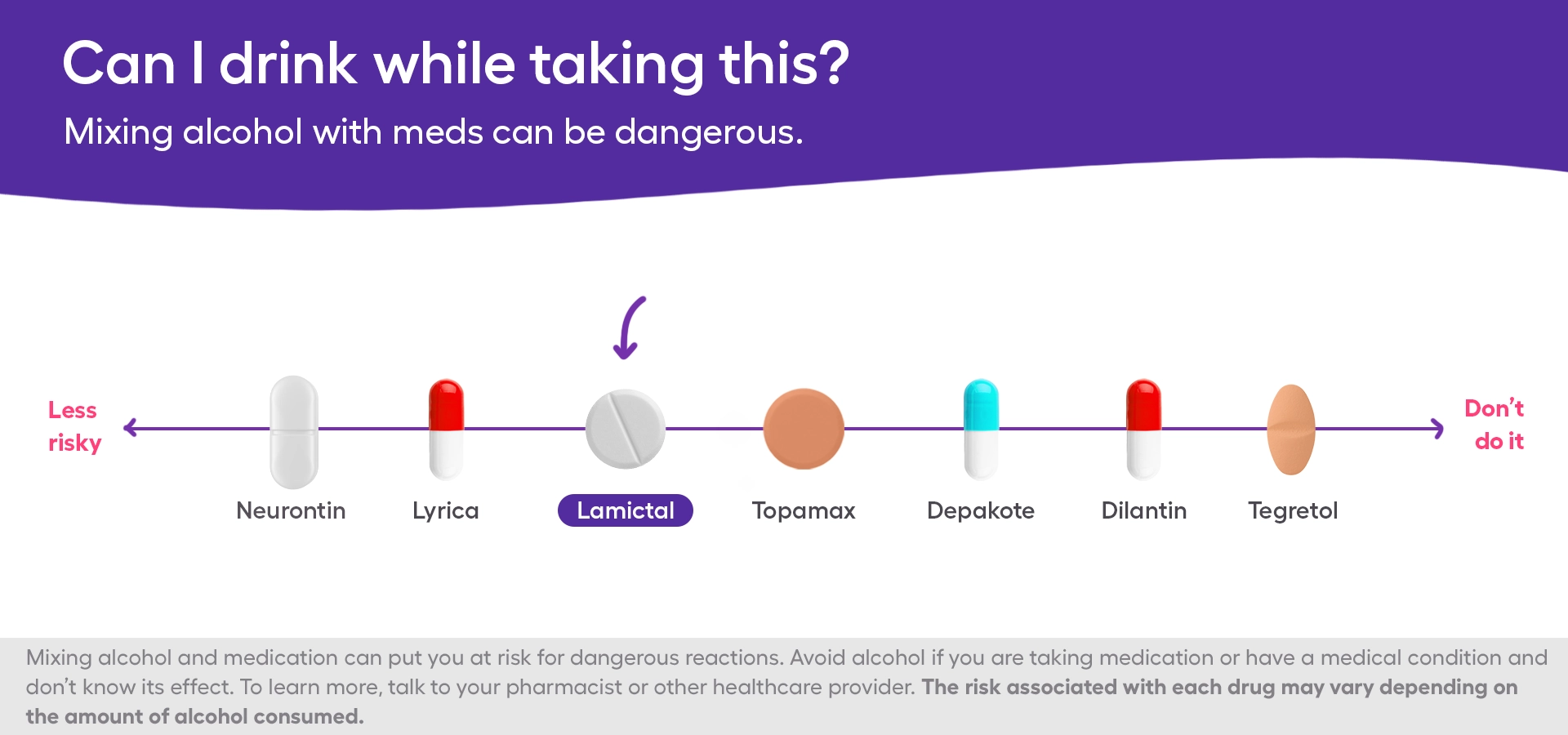Key takeaways
Drinking alcohol can worsen the common side effects of lamotrigine, like nausea, vomiting, drowsiness, and dizziness.
People with kidney or liver problems and older adults should be especially cautious when mixing alcohol and lamotrigine.
It’s not recommended to drink alcohol when first starting lamotrigine until your condition is controlled and you know how the medication affects you.
If you’re taking lamotrigine, also sold under the brand name Lamictal, you might wonder if you can still enjoy a drink with friends on the weekend. It’s a common question—after all, social situations often involve alcohol, and completely avoiding it can be challenging. However, you’ll want to consider the effects of mixing alcohol with lamotrigine and how it could affect your health and well-being, specifically while managing bipolar disorder or epilepsy.
It’s generally not recommended to mix lamotrigine and alcohol, especially when you first start the medication. Alcohol can increase side effects like dizziness or drowsiness and can even increase the risk of seizures. If you’ve been on the medication for some time and know how your body responds, drinking in moderation might be acceptable, but it’s always best to check with your healthcare provider first.
Can you drink while taking lamotrigine?
The question of mixing lamotrigine and alcohol doesn’t have a simple yes or no answer. The drug label doesn’t explicitly forbid alcohol while taking lamotrigine, but it does mention that you may be more intolerant to alcohol while taking lamotrigine. Most healthcare professionals recommend avoiding alcohol or limiting consumption if you have epilepsy, as alcohol may intensify some side effects of lamotrigine or counteract its benefits.
Excessive drinking can be particularly risky, as it might worsen the medication’s sedative effects. For some people who know how lamotrigine affects them, occasional drinking in moderation might be allowed. Drinking in moderation means no more than two standard drinks per day for men and no more than one standard drink per day for women.
In some cases, lamotrigine may help reduce excessive alcohol consumption, particularly in people with alcohol use disorder.

What happens if you mix lamotrigine and alcohol?
The effects of alcohol and lamotrigine can overlap, as both substances affect the central nervous system (CNS). Combined, they can worsen side effects or create new health risks that might not have happened if you consumed each one alone.
Nausea and vomiting
Lamotrigine can sometimes cause gastrointestinal problems as a side effect when taken normally. Some people feel sick to their stomach or vomit when they first start taking this medication or when their dose increases. Alcohol is also known to irritate the stomach and can make people feel nauseated. Nausea and vomiting from combining the two might make it hard to keep food or even your medication down and affect how well lamotrigine works for your condition.
Drowsiness or dizziness
Lamotrigine can cause drowsiness and dizziness, although these effects are usually mild. Alcohol is a CNS depressant that also causes drowsiness and coordination problems. When combined with lamotrigine, these effects can become much stronger and dangerous, affecting daily tasks that require alertness. Many people don’t realize how impaired they are until they try to drive or operate machinery, creating serious safety risks.
Heart rhythm problems
Lamotrigine can affect heart function by slowing the conduction of electrical signals in the heart. This medication has what’s called “Class IB antiarrhythmic activity,” which means it can potentially disrupt the heart’s electrical pattern. Alcohol can also affect heart rhythm, especially when consumed in large amounts. Therefore, mixing heavy alcohol use and lamotrigine may lead to an increased risk of abnormal heart rhythms.
Infections
Lamotrigine may trigger an increased immune response in some people, leading to flu-like symptoms like fever, headache, and weakness. On the other hand, alcohol is known to weaken the immune system, making it harder for your body to fight off infections. Combining lamotrigine and alcohol could potentially worsen effects on the immune system and increase the risk of common illnesses like colds or flu.
Suicidal thoughts
Lamotrigine, like other anti-seizure medications, carries a warning about increasing the risk of suicidal thoughts or behaviors, mostly when first starting treatment. Alcohol is a depressant that can worsen mental health conditions like depression and anxiety. As a result, drinking regularly while taking lamotrigine may lead to more severe mood changes that can cause or intensify suicidal thoughts. This combination is particularly risky for people with bipolar disorder or depression who are already at higher risk for suicidal ideation.
Increased risk of seizures
Lamotrigine works by stabilizing electrical activity in the brain to prevent seizures. Alcohol can interfere with this medication’s effectiveness by lowering the seizure threshold in your brain. While drinking, you may be more susceptible to abnormal electrical activity in the brain, counteracting the protective effects of the medication. The risk increases with heavy drinking, but it can happen even with moderate alcohol consumption.
Are certain people at greater risk of side effects?
When taking lamotrigine and consuming alcohol, some groups might have increased risks of experiencing adverse effects. These individuals need to be cautious about mixing these substances due to how their bodies process medications.
People with kidney or liver problems
People with kidney or liver problems need to use caution when mixing lamotrigine and alcohol. The kidneys help remove drugs from the body, and if they aren’t working well, lamotrigine can build up and cause more side effects, especially when alcohol is involved.
The liver also helps break down lamotrigine, so if it isn’t working properly, the medication can stay in the blood longer, increasing the chance of side effects. Because of these risks, lower doses of lamotrigine are recommended for people with liver problems, and it may be recommended that they avoid alcohol completely.
Older adults
Older adults tend to experience more pronounced side effects when mixing lamotrigine and alcohol. As we age, our bodies become less efficient at breaking down medications and alcohol. The CNS side effects of lamotrigine, like dizziness and coordination problems, already increase fall risks for older adults. Adding alcohol can worsen these risks.
How long after taking lamotrigine can you drink alcohol?
Lamotrigine can stay in the body for quite some time. You may need to wait several days after taking lamotrigine before consuming alcohol, as the medication’s half-life is around 25 to 33 hours for most adults taking no other medications for epilepsy. The half-life is the time it takes for half of the drug to leave your system.
It generally takes about five half-lives for a medication to be mostly cleared from your body. For lamotrigine, it could take up to a week to be completely eliminated. During this time, drinking alcohol could still lead to increased side effects of dizziness and drowsiness. The risk of side effects from combining alcohol peaks in the first few hours after taking a dose of lamotrigine, with the potential risks lasting until the drug leaves your system.
Which anticonvulsants are not affected by alcohol?
Other treatment options for epilepsy and bipolar disorder can be affected by alcohol in similar ways to lamotrigine. When you mix alcohol with anticonvulsant medications, side effects often become worse. Because alcohol can increase seizure risks, it can counteract the effects of all antiepileptic drugs.
The severity of mixing lamotrigine with alcohol depends on several factors, such as how long you’ve been taking the medication, the amount of alcohol you drink, and how alcohol affects you. Alcohol typically intensifies the sedative effects of many anticonvulsants, causing increased dizziness and drowsiness.
Anticonvulsant medications that should be used with caution when drinking alcohol include:
- Tegretol (carbamazepine)
- Dilantin (phenytoin)
- Depakote (valproic acid)
- Neurontin (gabapentin)
- Topamax (topiramate)
- Lyrica (pregabalin)
For antidepressants that have anticonvulsant properties, such as amitriptyline, bupropion, and fluoxetine, the same caution applies. Combining them with alcohol can lead to increased CNS side effects.
The bottom line
Mixing lamotrigine with alcohol can increase dizziness, drowsiness, nausea, and seizures—especially when first starting a new medication regimen or after a dose change. Although occasional moderate drinking may be tolerated if you have been taking lamotrigine for a long time, alcohol can still reduce the drug’s effectiveness and increase the risk of serious side effects like mood swings, heart rhythm changes, or suicidal thoughts. People with liver or kidney problems or older adults may be more vulnerable to serious problems. It’s best to consult a healthcare provider for medical advice before drinking while taking lamotrigine.
- Lamotrigine, MedlinePlus (2021)
- Lamictal highlights of prescribing information, U.S. Food and Drug Administration (2021)
- Drink alcohol only in moderation, Office of Disease Prevention and Health Promotion (2025)
- Effects of lamotrigine in patients with bipolar disorder and alcohol dependence, Bipolar Disorders (2006)
- Alcohol, MedlinePlus (2024)
- Alcohol’s effects on the cardiovascular system, Alcohol Research (2017)
- FDA Drug Safety Communication: FDA warns of serious immune system reaction with seizure and mental health medicine lamotrigine (Lamictal), U.S. Food and Drug Administration (2018)
- Mental health issues: alcohol use disorder and common co-occurring conditions, National Institute on Alcohol Abuse and Alcoholism (2025)
- Alcohol as a seizure trigger, Epilepsy Foundation (n.d.)
- Lamotrigine, LiverTox (2019)
- Pharmacokinetics in older adults, MSD Manual (2022)
- Effect of antiepileptic drug comedication on lamotrigine clearance, JAMA Network (2005)
- The serotonergic and noradrenergic effects of antidepressant drugs are anticonvulsant, not proconvulsant, Epilepsy & Behavior (2005)




